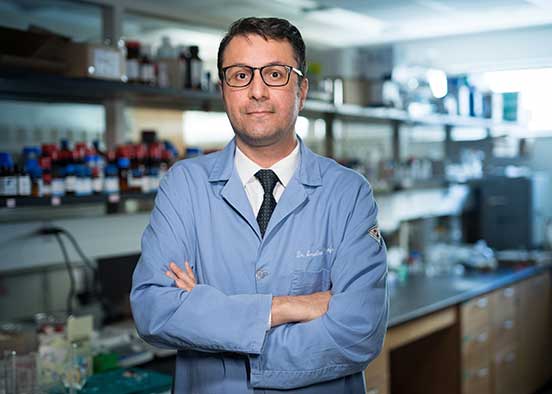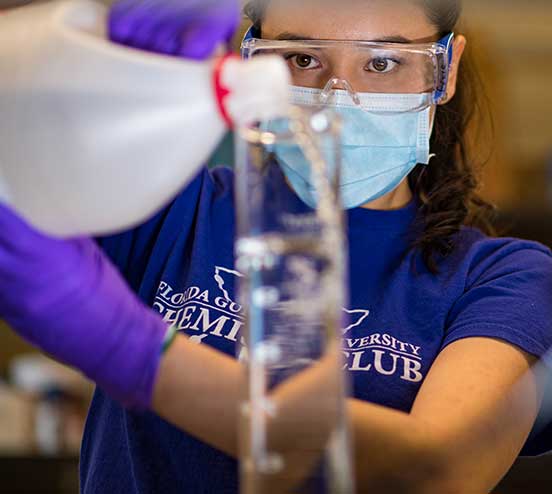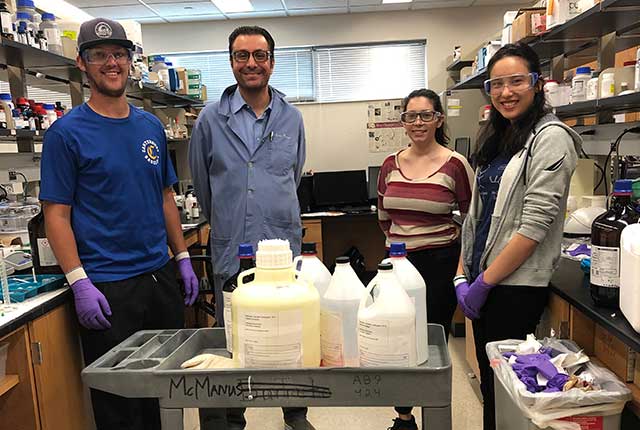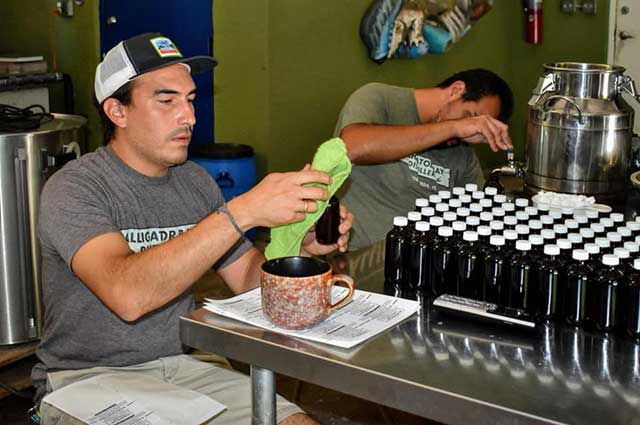An FGCU chemistry professor’s idea to make potent hand sanitizer in the chemistry research lab has yielded a winning formula for helping the community while inspiring students to put their knowledge and skills to work for the greater good.
To support the current efforts in Southwest Florida to fight the pandemic threat, Associate Professor Arsalan Mirjafari selected three undergraduate research assistants to help him turn ingredients donated by the chemistry department and his research lab into what these days amounts to liquid gold. Supplies of commercially made hand sanitizer quickly dried up as the coronavirus spiraled and health officials pleaded with the public to keep clean to stop the spread. Mirjafari’s team has already produced 40 liters — about 10.5 gallons — and is awaiting additional supplies for another batch for local hospitals.

Created with a World Health Organization (WHO) formula combining alcohols (ethanol and isopropyl alcohols), hydrogen peroxide, glycerol and distilled water, the first FGCU-made hand sanitizer was distributed through the Physical Plant, according to Emergency Management Director Ruth Rodrigues. Departments that interact with people or products the most — such as the mailroom, campus housing and enrollment — were given highest priority, she says, with any surplus being distributed to area hospitals.
High-concentration alcohol mixtures — 80% ethanol or 75% isopropanol — are not only excellent antibacterials, but quickly inactivate viruses such as SARS-CoV-2 (a.k.a. coronavirus), HIV and hepatitis B and C viruses, Mirjafari says. As a chemist as well as an educator, he feels a duty and obligation to have a constructive contribution to combat COVID-19 and try to save lives.
“Each of us has a responsibility to support our community — not just health workers — that’s why we started this project,” he says. “I have access to a lab, resources and funding to order chemicals. Between my department and my research lab, I was able to collect 40 liters of alcohols as a powerful antiviral agent for surface disinfection.”
For student volunteers Grace Anderson, Isabella Riha and David Siegel, the project additionally serves as an opportunity not only to hone lab techniques, but to experience firsthand how their work as scientists can positively impact society and to share pertinent safety information with friends and family.
“As a higher-education institution, our job goes beyond teaching classes — our mission must be to provide hands-on training for our students,achieve advancement of scientific knowledge and improve economic competitiveness in the United States,” Mirjafari says. “The ultimate goal of science and technology is to improve quality of lives, especially in this critical time of crisis. We are a group of trained chemists helping our community to defeat this monster, spreading knowledge and providing them effective hand sanitizer.”

Anderson, 18, a sophomore biochemistry and music major who entered FGCU as a dual-enrolled high school student through the ACE Program, already shares her mentor’s sense of mission after a year of working alongside him on multiple research projects to address unmet needs in health care.
“That’s why we work well together,” the Honors College member says. “He’s really inspired a lot of my goals and what I want to do. I’ve always had a pretty clear image of how I can help the world through chemistry. My research projects are always health and medicine related. I’ve always seen a very direct cause-and-effect relation between what we’re doing in the lab and the benefits that can arise in real world. This is happening in very real time, affecting everyone right now, and I can help in a small way.”
As part of the FGCU Chamber Choir called back early from a European tour in March, Anderson already had a head start on dealing with coronavirus fallout. She had to self-quarantine for two weeks after returning to Fort Myers. Fortunately, none of the singers showed signs of illness, she says.
Eager to return to the problem-solving science she’s loved since she was young, Anderson joined Mirjafari and her peers in a Seidler Hall lab — maintaining safety practices, of course — to produce hand sanitizer. The plan is to keep making the antiviral liquid as long as they could obtain supplies. The most challenging part for the all-volunteer effort is finding active ingredients in large scale, says Mirjafari, who earned his Ph.D. in organic chemistry.
Situations like today’s underscore the critical need to keep advancing knowledge, supporting STEM education and preparing the next generation of scientists like Anderson. She has been accepted into an elite summer undergraduate research program at the Massachusetts Institute of Technology (MIT) — currently one of her “top picks” for graduate school down the road. She also is the first FGCU student who has received the Barry Goldwater Scholarship, the most prestigious award for undergraduate research in U.S.
“Our faculty and students have a lot of potential to help the community and generate new knowledge scientifically,” Mirjafari says. “We have cutting-edge research facilities, we received National Science Foundation funds and we train our students well. We can do a lot.”

Alum’s distillery also lifting spirits by producing hand sanitizer
Chemists aren’t the only people shifting their attention to making hand sanitizer to help mitigate the current shortage. Hundreds of distilleries and breweries across the country, including one FGCU alumnus-owned company based in Southwest Florida, have converted production from spirits to antiviral liquid.
Alex Voss (’08, Marketing) and his brother, Ben Voss, own Alligator Bay Distillers in Punta Gorda, where they’ve crafted small-batch rums and whiskeys since 2015. They’ve set aside production of adult libations for now — though they have stock available — in order to focus completely on mixing sanitizer that could help stop the spread of coronavirus and save lives.

A portion of each batch is being donated to first responders and the most vulnerable of the community, according to the company’s Facebook page, and the first donation went to the Punta Gorda Fire Department. The remainder is being bottled and sold at cost at the Marion Avenue distillery for $4 for a 4-ounce bottle; buyers are limited to two bottles for each batch.
“We are using the formula approved by the FDA and created by the World Health Organization,” Alex Voss explained in an email. “The formula includes the alcohol at no less than 91 percent concentration with an added mixture of glycerin, hydrogen peroxide and reverse-osmosis water. The bottled sanitizer is 80 percent concentration.”
The brothers can produce hundreds of bottles a week, with family members and friends volunteering to help the two-man operation with bottling and labeling. But the need is far greater, and other Southwest Florida distillers are joining the wave of independent businesses helping to fill the void. Industry experts estimate that more than 600 distillers across the nation are involved in sanitizer production, according to an April 2 ABCNews.com report.
“The main challenge we’ve encountered during the switch in production is suppling demand,” Voss said. “We are producing between 700 and 1,000 bottles a week, with a demand exceeding 5,000. We have also faced delayed delivery times receiving the supplies necessary to produce the hand sanitizer.”
Last week, they decided to drive to Lake Placid to pick up their order of 4,000 4-ounce bottles because delivery was delayed and they were itching to crank up production. They plan to continue to producing hand sanitizer through April and possibly May.
“Because of the crisis, we are allowed by the federal government to produce sanitizer until the end of June,” Voss said. “Otherwise, we may need to apply for the permit that would allow us to produce sanitizer once the current waived provisions are lifted. We will continue to supply as many individuals as possible and would like people to be patient while we work through this crisis together.”
In the meantime, follow Alligator Bay updates on Facebook. Organizations in need can request more information by email at [email protected].